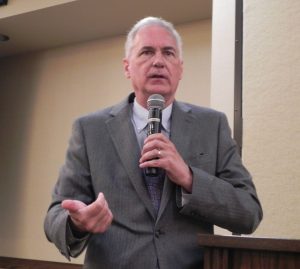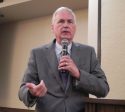Washington, DC — Mother Lode Congressman Tom McClintock referenced Thomas Jefferson, and the first amendment, during a hearing focused on the rise of hate speech on social media networks.
The House Judiciary Committee held a hearing yesterday in Washington, DC about the issue of potential regulations on tech providers, and ways to slow the rise of hate speech on the internet.
Tech leaders from Facebook and Google were on hand to take questions, and they argued that a big challenge is striking the balance between giving someone a voice and still creating a safe online environment. Lawmakers have been debating whether self-regulation works for tech companies, or if federal legislation is needed.
The Republican Representative, McClintock, argued that, “Speech can be ugly, disgusting, hateful, prejudiced and alarming. But it can never be dangerous to a free society as long as men and women of good will have the freedom of speech to dispute it, challenge it and reject it.”
He added, “Free societies do not punish words and thoughts – they punish deeds. The reason is because words and thoughts can be countered by better words and thoughts – that’s why we have the First Amendment.”
You can read McClintock’s entire speech below:
“I am afraid that both sides are losing sight of why we have a First Amendment? It is because the freedom to speak your mind is absolutely essential in a free society. Jefferson said, “Error of opinion may be tolerated where reason is left free to combat it.”
Speech can be ugly, disgusting, hateful, prejudiced and alarming. But it can never be dangerous to a free society as long as men and women of good will have the freedom of speech to dispute it, challenge it and reject it.
Free societies do not punish words and thoughts – they punish deeds. The reason is because words and thoughts can be countered by better words and thoughts – that’s why we have the First Amendment.
Suppressing speech — even the most hate-filled speech — doesn’t diminish its influence. It strengthens it. Churchill made this point when he said, “It is this very conflict of spiritual and moral ideas which gives the free countries a great part of their strength. You see these dictators on their pedestals, surrounded by the bayonets of their soldiers and the truncheons of their police…yet in their hearts there is unspoken fear. They are afraid of words and thoughts: Words spoken abroad, thoughts stirring at home – all the more powerful because forbidden – terrify them. A little mouse of thought appears in the room, and even the mightiest potentates are thrown into panic…A state of society where men may not speak their minds, where children denounce their parents to the police, where a business man or small shopkeeper ruins his competitor by telling tales about his private opinions – such a state of society cannot lone endure if brought into contact with the healthy outside world.”
As we are seeing across the world today, it is a very slippery slope between banning hate speech and banning speech you hate. We’ve seen so many examples recently (even in our own country) of legitimate speech being suppressed on college campuses, on social media platforms, and even in public discourse.
If there is an ideology or idea we don’t like, the weakest thing we can do is try to forbid it or suppress it. The strongest thing we can do is to use our own freedom of speech to confront it and defeat it on the merits. If we allow our society to become a society where men and women may not speak their minds, we will have lost the very quality that he said gives free countries a great part of their strength. As Churchill said, these ideologies cannot long endure if brought into contact with the healthy outside world – but that in turn REQUIRES unrestricted freedom of speech – precisely the freedom protected by our First Amendment.
We have made very limited exceptions when speech becomes an explicit incitement to do violence or to falsely defame an individual’s reputation. In the case of defamation, the truth is always an absolute defense.
What we are hearing now is something fundamentally different. It is to set up government or corporate officials to decide what speech is acceptable and what is not. That is a very dangerous power that can quickly be abused.
Today, a great deal of public discourse is conducted on social media – major platforms like Google and Facebook and Twitter. We have granted them legal immunity from the content of their platforms under the assumption that they merely provide the public square, and that those who use it should be held accountable for their own statements. This is appropriate as long as these platforms are not practicing any form of censorship (except in the case of explicit incitement to violence) or political favoritism.
We are discovering, however, that they are indeed practicing censorship and political favoritism. This is their right as private corporations. But once they begin to do so, they cease to be neutral platforms and instead become publishers responsible for their content and subject to liability for defamation.”


